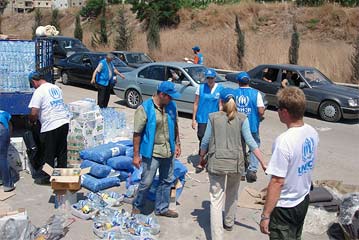Lebanese vacate shelters and head home to see the damage
Lebanese on Tuesday all but emptied public parks and buildings that had become their homes through a month-long bombardment of their cities and villages, continuing an exodus that began as soon as the ceasefire took effect.

UNHCR staff distribute goods such as plastic sheeting, mattresses and water to Lebanese heading back to their home areas. © UNHCR/R.Alsalem
BEIRUT, Lebanon, August 15 (UNHCR) - Lebanese on Tuesday all but emptied public parks and buildings that had become their homes through a month-long bombardment of their cities, towns and villages, continuing an exodus that began as soon as the ceasefire took effect.
A UNHCR team operating south of Beirut found village schools that had sheltered thousands of displaced were almost empty. In Aitat village, those in the school had fallen from 464 to two families. In Ain Unub, only four families were left from the 350 people before the ceasefire, which took effect at eight in the morning Lebanese time on Monday.
The situation was similar In Beirut, where 130,000 displaced were in temporary shelters before a final surge of violence in the last days of the war. Beirut Mall had held 1,700 people - mainly from an area of the Lebanese capital that Israel had threatened to bomb last week - but was empty on Tuesday. The number sheltering in Sanayeh Park, in the heart of the city, fell from 1,200 to 450 people.
The flood of Lebanese back from Syria, where 180,000 had found refuge, rose from the high numbers already seen on Monday. By six in the evening, UNHCR recorded that nearly 22,000 Lebanese had returned from Syria during the day, following the return of 16,000 on the first day of the ceasefire. At the Yabous border crossing - on the main Damascus-Beirut highway - 1,500 people per hour were entering Lebanon.
UNHCR helped organise a number of bus convoys to ferry Lebanese back from Syria to the major cities of their country. Six buses carried 240 Lebanese back to the town of Hermel in the north of the Bekaa Valley, while two others took 80 Lebanese from the Syrian city of Homs to Beirut. Similar movements will continue in the next few days in cooperation with the International Organization for Migration.
In Damascus, an initial five-bus convoy assembled by UNHCR left for Lebanon on Tuesday and another 11 buses, added at short notice because of the growing number of requests to return, were expected to follow.
Lebanese had arrived from different sites in Damascus, sitting in the limited shade provided by their belongings. Children, tired and nervous, cried. Fathers ran about with babies in their arms, anxious to find the bus that would return them to their home towns. But there was relief to be heading home.
"We have been here for two weeks now," said Shadab Abdallah, a 26-year-old father. A family in Damascus had put them up. "When we came to Syria, we had to take a taxi. They charged us US$50 per person and we had no option but to pay," he said. "It is so good that we are brought home now, we wouldn't have the money to go back otherwise.
"We don't know what happened to our home in Tyre, they dropped so many bombs there," said Shadad. "And we don't want to think about it now. Now we are just happy to go. Very happy. Once we are back home we will decide what to do. If our home is still there, wonderful - if it is destroyed, then we'll have to start to think of a solution. But not now."
The reality that many people had lost their homes was underlined by UNHCR teams reporting that in many areas to the east and north of Beirut initial returnees were often male members of families going home to see the conditions. They found that some people who had rushed south on Monday were already returning with the news that their families had lost everything.
Although precise numbers were hard to verify, UNHCR estimated that about 522,000 displaced were still sheltering on Tuesday in public locations or with host families. Before the ceasefire, about a million Lebanese had been displaced, including 180,000 in Syria.
UNHCR had teams operating around-the-clock at four border points from Syria, distributing return packs including water, rehydration salts and high-energy biscuits. They were also monitoring for vulnerable individuals who needed special assistance.
Inside Lebanon, UNHCR teams set up at major points on the return routes and distributed assistance such as plastic sheeting, mattresses, water and other items to returnees. They were issuing warnings about the danger posed by unexploded munitions that litter the landscape.
The ceasefire has allowed an increase in the arrival of assistance needed for returning families, especially the unknown number who are now homeless. A UNHCR-chartered C-130 aircraft flew into Beirut from Jordan on Tuesday with tents, mattresses and a warehouse tent.
In addition, four flights with UNHCR supplies were landing in Cyprus during the day with 1,120 canvas tents and 1,200 lightweight tents, plus seven warehouse tents that will be loaded onto a ship headed to Lebanon this week. The tents will be erected in southern Lebanon so supplies can be stockpiled nearer the areas of greatest need.
A French ship carrying large amounts of UNHCR supplies, including six-wheel-drive trucks that can traverse even severely damaged roads, is expected to dock in Beirut on Wednesday.
By Annette Rehrl in Damascus, Syria
and Astrid van Genderen Stort in Beirut, Lebanon
